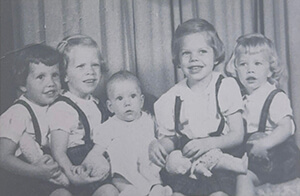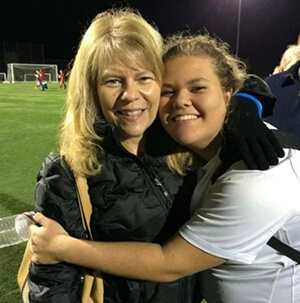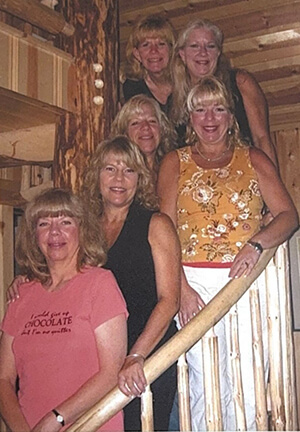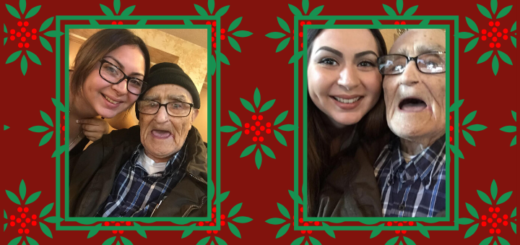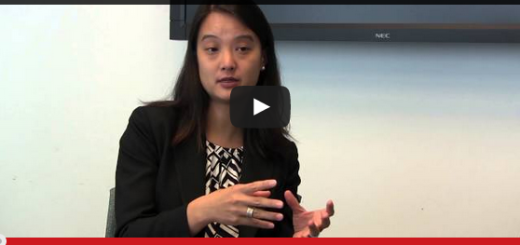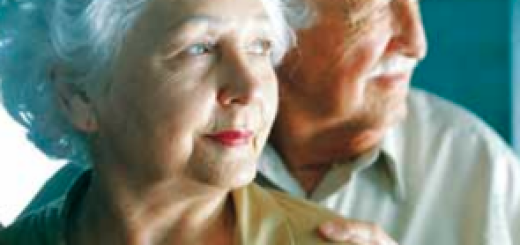A mother’s decline, a daughter’s future: Navigating Alzheimer’s and genetic risks
When Sarah was only 13 years old her mother Kathy’s behavior began to change. Six years later, Kathy was diagnosed with younger-onset Alzheimer’s at the age of 59. After Kathy’s death, the family learned they have one of the genes for Alzheimer’s. Sarah shares the story of seeing the signs in her mother as a teen, losing her mother in her 20s and now facing an uncertain future around her own inevitable diagnosis.
Supporting her family
Kathy Scott was the middle sister of seven sisters. As an adult, she loved to host family and friend gatherings. She had two children, a boy and a girl, who she raised on her own as a single mother. Always ready to help her family, Kathy took on the role of loving aunt who cared for her nieces and nephews alongside her own children while her sisters worked outside the home.
“I had so much fun being raised by her,” said her daughter Sarah. “She was involved with everything I did. She came to every sports game I had. She always cared for other family members. I had cousins over and Mom raised a lot of us together. She was a good mom.”
Dismissing the signs
However, things began to change for Sarah when she became a teenager. Kathy would get confused and frustrated about things which would lead to anger. “She’d come into my room and yell at me for no reason,” recalled Sarah. “If I called her out for forgetting something important, she’d get mad. [I didn’t understand] why she was angry all of a sudden.”
By the time Sarah was 16 Kathy was using tools to help her remember things. She’d text Sarah to remind her of their schedule, use a large calendar to write down important events and leave Post-it notes all over the house to remind her of things that most people wouldn’t need help remembering.
As time went on Kathy started to repeat herself, telling stories to her kids she’d just told them. When Sarah was 17, she and her brother decided it was time to ask their aunts for help. “[Mom] would blame her memory issues on ‘old age,’” said Sarah. “Her sisters agreed with her and shut us down.”
There are many myths, misconceptions and stereotypes about Alzheimer’s disease. At this time Kathy was in her mid 50s. It isn’t uncommon for people who are younger to not believe they have the disease and ignore or dismiss the signs.
Moving to college
The next year, Sarah moved away to college and communication from her mom stopped altogether. Kathy wasn’t checking in on Sarah and wouldn’t respond to texts. Sarah noticed Kathy had stopped seeing her friends. All of these things combined raised some immediate red flags for Sarah and she knew something was wrong with her mom but didn’t know what.
By Sarah’s second year at college Kathy’s sisters had finally agreed that this was more than just normal aging. “She wasn’t showering and the only thing she had her cupboard was peanut butter, jelly and bread,” said Sarah. “She got fired for not showing up for work.”
Getting a diagnosis
Sarah wanted to get her mother diagnosis but Kathy refused to go to the doctor. “I had to use reverse psychology [on my mom],” said Sarah. “I said, ‘Mom, obviously you don’t have [the disease]. Let’s just go to the appointment and prove everyone wrong.’ She’s like, ‘You’re right!’ and that is how I got her to go.”
It took Kathy three months to get a neurology appointment and another four months to get an MRI. At this point, Kathy’s symptoms had progressed enough that these tests were more of a formality. Kathy received an official diagnosis of Younger-onset Alzheimer’s in October 2019 at 59 years old.
Alzheimer’s is not just a disease of old age. Younger-onset (also known as early-onset) Alzheimer’s affects people younger than age 65. Younger-onset is much less common, and prevalence among the nearly 7 million Americans living with Alzheimer’s is uncertain.
Sarah and her family made the difficult decision to place her mother in a local care setting. They sold Kathy’s house to help cover the cost of her care.
Visiting mom
Sarah’s college was nearly three hours from the assisted living Kathy was in, but that didn’t stop Sarah from visiting regularly. As the disease progressed, Kathy lost the ability to speak. Kathy’s decline increased dramatically once she began having seizures, and she died in February 2024.
“Looking back, it was for the best that I was off at college,” said a now 27 year old Sarah. “It was easier to be far removed and to think about it less. Mom was at the point, where if I went to visit once every week vs. once a month she wouldn’t know the difference. Better for me to spread out those visits because I was so young. The guilt ate away at me.”
Looking to the future
Family history is not necessary for an individual to develop Alzheimer’s. However, research shows that those who have a parent or sibling living with Alzheimer’s are more likely to develop the disease than those who do not have a first-degree relative with Alzheimer’s. Those who have more than one first-degree relative with Alzheimer’s are at an even higher risk.
Since Kathy’s diagnosis in 2019, four of her six sisters have been either been diagnosed or are showing signs of dementia. Sarah said, “Our family has a genetic mutation, and our odds are a bit higher.”
With this in mind, Sarah is already thinking about preventative measures she can take in order to delay the onset of dementia. “Researcher says if you follow a certain diet regime, [get good] sleep and have less stress in life, you’re going to have [the disease] later [in life] rather than earlier,” said Sarah. “A few years ago, I cut out red meat and fried food. I started exercising a lot more. I’m doing hot yoga, because it gets your body moving, and meditation is good for everything.
“[This disease] had me think about the future. Whether to have kids, but not my own [biological] kids if it’s genetic. My life is different now that I know [about the disease] than what I thought [it would look like] ten years ago.”
Connecting with the Association
In addition to her preventative measures, Sarah is also doing her part to help find a cure for this disease. Since her mother’s diagnosis she has been aware of the Alzheimer’s Association®, but 2024 was the first year she truly got involved.
In October Sarah signed up to participate in Walk to End Alzheimer’s – San Francisco where she and her team raised nearly $700. The money raised at Walk goes towards the care, support and research efforts of the Alzheimer’s Association. Sarah said, “It was fun, I loved all the volunteers cheering us on along the way. I loved everything that we could do before [we started walking].”
Then in November 2024 Sarah volunteered to become a member of the Alzheimer’s Impact Movement (AIM) and is now the ambassador for her local representative, Nancy Pelosi. AIM advocates impress upon policymakers the growing crisis Alzheimer’s presents to our nation’s families and the economy. Sarah will be part of a team inspiring leaders to take bold action at the federal and state level.
Alzheimer’s is not just for older adults
Many people think of Alzheimer’s and other dementias as a disease that only effects older adults. Sarah wants people to understand that sometimes this disease sneaks up on families sooner than expected. She thinks it’s important for people of all ages to be aware of the disease.
“I think a lot of people my age or younger, associate Alzheimer’s with people who are 80 years old and that’s not the case,” said Sarah. “[This disease is] super scary, very straining on caregivers and families, and not something I would think of until it happened to me and my mom.
“I feel like there’s not awareness [that] it can happen to people as young as my mom was. It could probably happen to them, just not necessarily at a super young age. Theres not a lot of awareness on how to prevent it or how important strengthening your memory is.”
Sarah encourages caregivers to spend as much quality time with their parent or loved one as they can. “It’s going to be a tough journey. It’s okay to cry, find therapy, all emotions are valid,” said Sarah. “Make memories not only for them, but for yourself. My mom was a great mother, and didn’t deserve any of this.”
Visit our website to learn more about younger-onset Alzheimer’s, or other dementias. For questions about the 10 warning signs visit alz.org/10signs or call our 24/7 Helpline at 800.272.3900 to speak with with a live person who can provide information, local resources, crisis assistance and emotional support.





